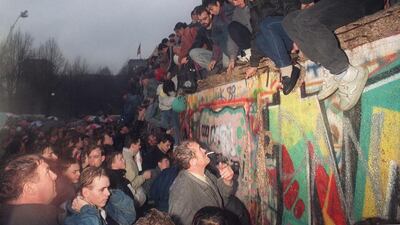The world as we know it has been shaped by political, economic, military and technological developments. The lasting effect of several of these changes influences our daily lives and will do so for many years to come.
There is talk of a new Sykes-Picot agreement redividing the region along ethnic and religious lines.
The sectarian and doctrinal conflicts we are witnessing today are reminiscent of the beginning of the religious wars that defined Europe during the Middle Ages.
It seems we are on the cusp of a new regional and international Cold War where the Middle East is a key arena.
While the Ottoman Empire completely unravelled almost a century ago, there are those who dream of its return and are actively working towards the realisation of this goal, considering it part of their religious duty. History has clearly bypassed them, as has the rule of the logic tied to the nation-state.
The fall of the Berlin Wall marked the end of a divisive ideology. Now we see those who are trying to create their own cultural, religious and sectarian divisions through the promotion of grand ideological theories such as the clash of civilisations.
There is a prevailing belief that the scale of destruction caused by the atom bombs dropped on Hiroshima and Nagasaki removed the spectre of a nuclear war taking place.
However, the mad desire to acquire nuclear weapons has consumed many countries and there are some among that group that can hardly be considered rational players.
These countries hold ambitions for domination based on religious tenets. The likelihood of nuclear weapons falling into the hands of terrorist groups is also a distinct possibility, meaning that another Hiroshima and Nagasaki cannot be ruled out.
The reader will note that I care most about events where the effect is likely to transcend both space and time, but I am less concerned with those that bear no relevance to the present day.
I also take great interest in sociopolitical, economic and cultural issues and concerns which we are currently experiencing regionally and internationally, such as: sectarianism, succession and revolution.
Added to this, I am also concerned with events in the Arab world that teach us about missed opportunities, historical precedents that govern development over time and readily available alternatives that help us to avoid repeating the same mistakes of the past.
For example, we must be careful to avoid the dangers that arise out of remaining silent towards extremism, being lenient towards grand designs for global dominance or ignorant of rising hostility between different communities, races, sects and cultures.
Historical catastrophes are often small and difficult to detect. The danger of such episodes is not always fully appreciated until they reach the point of explosion for which future generations pay a dear price with bloodshed and instability.
The history of the Arab and Muslim worlds, and the history of the entire world for that matter, is littered with specific acts, events and inventions that aimed to increase human happiness and facilitate development. Similarly, the moment in history we have reached today contains several rays of light that require our attention to help them to expand.
Such opportunities must be seized before it is too late so that history does not repeat itself and the world doesn’t have to endure similar catastrophes and tragedies to the ones it has faced before now.
Dr Jamal Sanad Al Suwaidi is the director general of the Emirates Center for Strategic Studies and Research. This is an extract from the first in a series of essays written by the author called Events That Changed History
